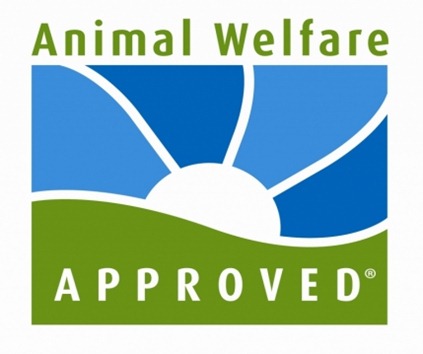Ever since reading and viewing the Books, Movies, and Blogs That Changed the Way I Think About Food, I’ve come to care not just about what the food I eat does to my body, but where it comes from, too.

One specific food that I really pay attention to the source of the product is the incredible, edible EGG. I really love to eat eggs – but obviously, eggs come from chickens, and I want my egg-producing chickens to be happy (or, at the very minimum, at least not completely miserable in egg-producing hell). When I’m buying eggs at the store and ‘voting with my grocery dollars,’ I DO NOT want to buy factory farmed eggs.
In hopes that I’m supporting farmers that treat their chickens right (which, to me, means no beak cutting, freedom to move around, and the space to do chicken activities, like running around and squawking), I’ll pay a premium for ‘good’ eggs at the grocery store. But labels can be deceptive. What does “farm fresh†really mean? (Answer: Not much!)
Here’s a breakdown of what egg carton labeling means from the Humane Society:
- Certified Organic: The birds are uncaged inside barns or warehouses, and are required to have outdoor access, but the amount, duration, and quality of outdoor access is undefined. They are fed an organic, all-vegetarian diet free of antibiotics and pesticides, as required by the U.S. Department of Agriculture’s National Organic Program. Beak cutting and forced molting through starvation are permitted. Compliance is verified through third-party auditing.
- Free-Range: While the USDA has defined the meaning of "free-range" for some poultry products, there are no standards in "free-range" egg production. Typically, free-range hens are uncaged inside barns or warehouses and have some degree of outdoor access, but there are no requirements for the amount, duration or quality of outdoor access. Since they are not caged, they can engage in many natural behaviors such as nesting and foraging. There are no restrictions regarding what the birds can be fed. Beak cutting and forced molting through starvation are permitted. There is no third-party auditing.
- Certified Humane: The birds are uncaged inside barns or warehouses but may be kept indoors at all times. They must be able to perform natural behaviors such as nesting, perching, and dust bathing. There are requirements for stocking density and number of perches and nesting boxes. Forced molting through starvation is prohibited, but beak cutting is allowed. Compliance is verified through third-party auditing. Certified Humane is a program of Humane Farm Animal Care.
- Cage-Free: As the term implies, hens laying eggs labeled as "cage-free" are uncaged inside barns or warehouses, but they generally do not have access to the outdoors. They can engage in many of their natural behaviors such as walking, nesting and spreading their wings. Beak cutting is permitted. There is no third-party auditing.
- Free-Roaming: Also known as "free-range," the USDA has defined this claim for some poultry products, but there are no standards in "free-roaming" egg production. This essentially means the hens are cage-free. There is no third-party auditing.
- Vegetarian-Fed: These birds’ feed does not contain animal byproducts, but this label does not have significant relevance to the animals’ living conditions.
- Natural: This label claim has no relevance to animal welfare.
There is also a program called Animal Welfare Approved, which is the highest animal welfare standards of any third-party auditing program. According to the Humane Society, “the birds are cage-free and continuous outdoor perching access is required. They must be able to perform natural behaviors such as nesting, perching and dust bathing. There are requirements for stocking density, perching, space and nesting boxes. Birds must be allowed to molt naturally. Beak cutting is prohibited.†However, unfortunately, there are currently no participating producers that sell eggs to large supermarkets under the Animal Welfare Approved program.
Other Animal Welfare Approved products are available in supermarkets and restaurants – just look for this label if you are interested! You can also browse out their website, which lets you search for products and restaurants by location, check them out on Facebook, and follow them on Twitter.
Now – I’m not naïve. I realize that at the rate our population consumes eggs, it would be difficult – if not impossible – to produce all eggs humanly. But my bottom line is that I don’t want to pay extra for nicely labeled eggs if the label doesn’t mean anything! Hopefully, more Animal Welfare Approved products will be available at my grocery store, and until them, I’ll stick with organic, free-range, certified humane, or cage-free eggs at the store. It’s not a perfect solution (perhaps getting eggs directly from a small local farmer is a better solution), but it works for me and satisfies my vegetarian gray area.
Do you care about labeling on egg cartons? Are you surprised to learn about the lack of regulation for many of these terms?


Thanks for this post. I try to be conscientious about the label on my eggs, but all the different “buzz words” most definitely had me wondering if they meant anything at all.
I’ll check out that website for the best brand to buy. Once I saw a video on factory farming, I was determined not to contribute to it. It’s just so heartbreaking.